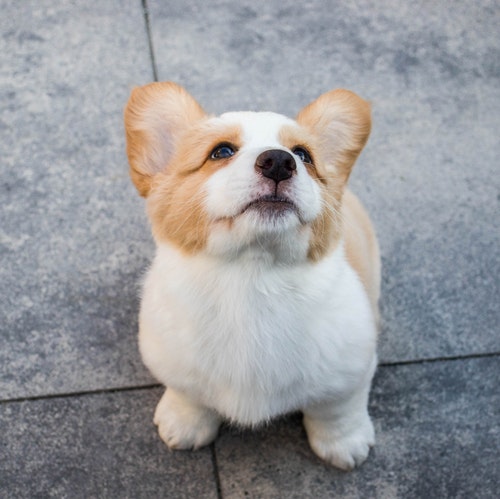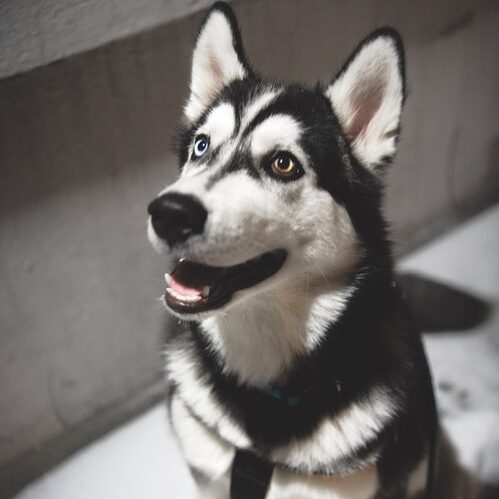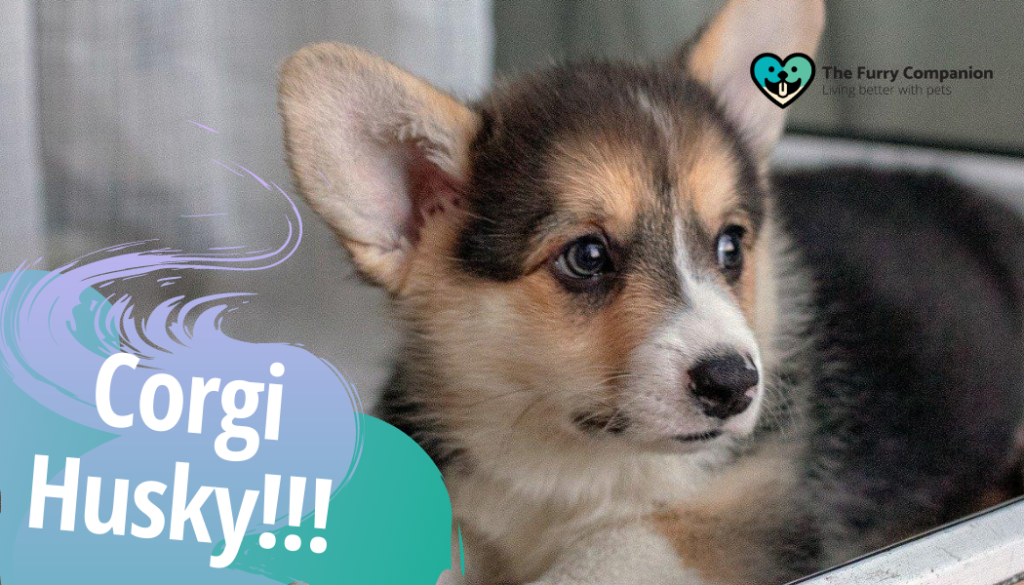What do you get when you put together the two most sought out dog breeds, Corgis and Siberian Huskies? An adorably pudgy and active Corgi Husky! This mix breed is also sometimes called Horgi, Corgsky, and Siborgi. A Corgi Husky will make a great addition to your growing family.
Here at the Furry Companion, we want to prepare aspiring Corgi Husky parents for the adventurous journey. These energetic pups can be a handful for novice fluffy parents, and their breed‘s popularity is still growing. We want to help gauge and excite you for a suitable environment and lifestyle for your Horgi babies. Aside from their stubby legs, unique looks, and playful demeanor, here are some reasons you should get your own Corgi Husky.
Table of Contents
The Tails of Two Infamous Parents
From its name, we can already say they are a mix of two great breeds. The petite yet peppy Corgi and the tall and independent Siberian Husky. The parent breeds have specific characteristics and traits passed onto Corgi Huskies that make them even more lovable.
Corgi
On the Corgi side, breeders choose between two Welsh species to parent the Horgi, Pembroke Welsh, and Cardigan breeds. However, breeders often go for the Pembroke Welsh Corgis. Corgis were originally herding dogs in charge of corralling sheep. Due to their small stature, they ensured themselves of being kicked by the sheep. Plus, their energetic temperament could keep up with livestock.
The name Corgi in Welsh directly translates to “dwarf dog,” describing the little things accurately. The whimsical history of the Welsh also told stories of Corgis ferrying fairies. These fables resulted in Corgi’s nickname, “fairy saddles.” To differentiate the two, Pembroke Welsh Corgis are famously known as Queen Elizabeth II’s beloved pets. They have docked tails and pointier and more erect ears.
On the other hand, Cardigan Welsh Corgis have fuller and long tails on one end and rounded ears atop their little heads. In terms of temperaments, both Welsh breeds are loving and loyal to family. Both kinds are vocal, so prepare for a lot of barking when strangers are around.
Between these two pastoral canines, Pembroke Corgis are the outgoing, mischievous and clumsy kind. Meanwhile, Cardigan Corgis are less social with strangers meaning they are more territorial and more suited to be fearsome, fluffy guard dogs.

Siberian Husky
Bobbing to the other side of the family tree, we take a look at the Siberian Husky’s sturdy and tall demeanor. If Corgis are herding animals, Huskies are equally hard-working canines. These medium-sized dogs are known for their ability to haul cargo or transport people through the coldest weather. Characterized by their wolf-like looks, Huskies have a mask of white fur markings which appeal to Husky lovers.
They are athletic and often fond of rough-housing when they play. In addition to their being loyal and intelligent, many people fall in love with the bond and energy Huskies crave with their owners. However, a Husky’s independent temperament can often challenge first-time owners.
They are the kind of dogs who, at times, won’t pester you for attention, but they can also be stubborn, especially during training. Owners need to exude confidence and order to establish an equally strong position as the trainer. Consistency is key to training these independent doggies.

A Fluffy and Adorable Ball of Fur
So, you get the best of both worlds when you put these two irresistible dogs together. A Corgi Husky is a rare mix that is not officially recognized by the American Kennel Club (AKC), American Canine Hybrid Club, or Designer Breeds Registry. However, demand for these Corgi Huskies has risen, and hopefully, they may be recognized by these influential organizations soon.
Size
The puppy phase of any dog is by far the cutest age, no arguments there. However, when you get a Corgi Husky, they will grow to only be small to medium dogs. A full-grown Corgi Husky grows 13 – 15 inches in height, often with long backs supported by short stubby legs. They usually grow up to 20 – 50 pounds covered by thick coats of fur tied up with a curved tail. On top of their round and fox-like shaped heads are big pointed ears and almond eyes.
Color
The appearance of the Corgi and Husky mix gives rise to a multitude of possibilities. Each Corgi Husky has a different and unique look to them. Horgi pups can inherit the coats of either parent breed, depending on the dominant trait. They can bear cream, reddish and orange-colored coats like a Corgi or black, grey, brown, white markings of a fearsome Husky.
Their coats may be singular or tri-colored. Lynn Buzhardt, DVM explains that “Despite the huge variety in coat color, there are only two basic pigments that determine the color of canines: eumelanin (black) and pheomelanin (red).”
Coat
Earlier, we mentioned a Corgi Husky has layers. A pup with long, straight, thick coats takes after their Corgi parent; meanwhile, the shorter and thicker double coats are from the Husky parent. If you worry about shedding too much, Dr. Denish says it is perfectly normal. According to Dr. Adam Denish, DVM “Some breeds shed year-round, as in Boxers or most short-coated dogs, while others, such as Huskies or Akitas, usually shed most [of their hair] twice a year.” Give them these dog vitamins for a smoother, healthier coat.
They’re Great For Small Homes
You don’t necessarily need a palace to raise your Corgi Husky. With their small stature, they are comfortable to live in apartments or tiny houses. They can always wreak havoc anywhere. Depending on which mix is more dominant, a Corgi Husky’s energy ranges from a Husky’s high prey drive to the herding Corgi’s lesser upbeat energy. Check this dog bed.
Even if they come home to a shoebox, Corgi Husky needs a vast space for walks and allocated times for play. A brisk walk in the neighborhood and an afternoon in the park can help expel their bouncing energy levels.
With a Corgi Husky’s wits, they need stimulating toys to enrich their active mind. Giving them toys to play with can help them keep their minds preoccupied. You can give your furry babies an array of durable plushies and training toys. Plush toys are like dolls kids carry around solely for their comforting abilities. They are often soft stuffed toys dogs bring with them to bed or for play, sort of like a security blanket.
On the other hand, training or interactive toys’ design is to withstand teething and to chew on by pups. Importantly, training toys enhance the bonding between the owner and Corgi Husky. They can be intricate puzzle toys, tennis balls, and rope toys for an aggressive game of tug-of-war.
A Horgi’s Loving, Loyal, and Intelligent Temperament
Like their appearance, the temperament of a Corgi Husky also makes up the best of both worlds. Aside from their appealing and huggable exteriors, they are loyal and pure friends for keeps. They are loyal dogs wanting to strengthen their bond with their owners and families. Despite being descendants of the Queen’s pampered Corgis, Horgis are very playful and energetic. Their sweet and loving nature makes up for their being horrible guard gods because they are friendly, even to strangers.
Meanwhile, Corgi Huskies are quite talkative. Inheriting Pembroke Welsh Corgi’s vocal temperament, Corgi Huskies love to bark. They may greet strangers with hello-barks or call for a friendly face when they are lonely. If you want a quieter or more independent Horgi, you may need to take the extra time training them and properly introduce them to friends, family, and visitors.
Another admirable trait about a Corgi Husky pupper inherited from their parents is their intelligence. Both parent breeds are known to be intelligent, making their offspring ideal to train. These dogs are curious and adventurous, requiring the full attention and supervision of their furry parents. These naughty and playful babies’ herding instincts may also kick in, and they may end up chasing bikes and kids when outside.
Just watch out when you’re training in open fields. Like training any other dog, Corgi Huskies need quality attention. If you can’t commit to giving it to them, it would be best to reconsider adopting them in the first place because they are a clingy pet requiring all the love and attention you can give.
They Are Trainable Dogs
A fair warning to aspiring owners that these dogs may suffer from separation anxiety, a trade-off to their loyalty. Yes, we’ve mentioned they are trainable, but we never said training them would be easy. In teaching these sensitive puppers, try managing their separation anxiety by leaving the pup alone for short periods. This brief exercise will help them get used to being by themselves. Leave them alone for a few minutes at first, and increase the time you leave them incrementally.
A method that trains dogs regarding independence and creates a safe environment for them is crate training. When you live in a compact apartment, investing in a durable and comfy crate for your Corgsky is not such a bad idea. According to Pat Miller, CBCC-KA, CPDT-KA, establishing the proper mindset to crate train, your dogs help with anxiety. “Once your pup is crate-trained, you have a valuable behavior-management tool for life.” Gradually inviting them in their spacious crate for short periods, then longer, helps them become more comfortable.
Corgi Husky puppies are eager to please their furry parents, making them moderately easy to train. The best way to reinforce desired behavior is through reward-based training, positive reinforcement. After a particular exercise, like staying in a crate, give them a treat. The same advice goes for necessary training activities like teaching them new tricks.
Be gentle in training your Corgi Huskies and consistent in your methods. Have their training sink in, start them early, and give them all the support they need.
This designer mix is quite the handful at home, and they are very rare to some level. If you are looking for energetic dogs who won’t take up much space, welcome a Corgi Husky to the family. These playful little Corgi Huskies need a nurturing home to support a healthy and active lifestyle. While there are several reasons for getting a Corgi Husky, always think of your resources such as time and money, making a good and safe life for this fluff ball. They may be loyal companions, but they will rely on you for a better life.
Frequently Asked Questions
Do they make excellent family dogs?
Yes, with their warm and playful attitudes, Corgi Huskies are great family dogs. They are sweet and sociable with kids. However, owners must still introduce this mixed breed with necessary care and precautions, so they do not end up being aggressive dogs.
How much food should they eat?
According to the Veterinary Medical Center of the Ohio State University, there are many factors needed to calculate your dog’s basic caloric needs like Resting Energy Requirements or RER, the life stage and activity level of your dog, and the muscle condition score. Cases differ from one dog to another, so it is best to consult with your local veterinarian about your Corgsky’s protein and caloric intake.
With the help of an expert veterinarian, fluff parents become more aware of the dog’s specific requirements to maintain a healthy lifestyle. Managing its feeding hours is also helpful in keeping their diet in check.
What are common complications a Corgi Husky experiences?
To get a full rundown of your dog’s genetic history, ask the breeder or the adoption agency of the health profiles of your Horgi’s parents. This step will help you get a good look at your Corgi Husky’s health chart, allergies, and any possible complications.
Looking at both sides of the parent breeds, Corgi Huskies are at risk of developing the following health conditions:
- Obesity, the most common condition due to their body composition, but it may worsen because of a lack of proper diet and exercise.
- Hip Dysplasia
- Hypothyroidism
- Eye Problems like cataracts or Progressive Retail Atrophy (PRA)
- Von Willebrand Disease, a condition wherein your dog’s blood clotting is not so effective.
- Spinal Issues typically result from the dog’s long back and short legs.
- Dog Seizures or Epilepsy
How long do they live?
Corgi Huskies can live up to 10 to 15 years. With proper care and lots of love, this dog breed can last pretty long.
Are they hard to maintain grooming-wise?
With their thick coats and sometimes double coats, they often need brushing around twice a day. It becomes more frequent when the shedding season is just around the corner. Detailed owners may also take their precious babies to the groomer’s every week.
How much do Corgi Husky’s cost?
The cost of a Corgi Husky depends on whether the parents are purebred. Usually, Corgi Husky pups can range between $300 to $1000.
Where can you adopt a Corgi Husky?
Since organizations do not recognize Corgi Huskies as a purebred dog, and they do not have a standard for breeding them, rescue clinics rarely have them. However, it is not impossible to find breeding centers specializing in Corgi Huskies or any other Corgi or Husky mixes. Do thorough research on the backyard breeder or puppy farm you are planning to purchase your pup. Good breeders will have performed heath checks on the dogs and the homes looking to adopt the puppies. Before sending them home, they must have arranged a check-up session or vaccinations for the puppies with a certified veterinarian.
What’s the typical lifespan of a corgi husky?
A corgi husky’s typical lifespan is between 12 and 18 years. This is a healthy lifespan, and it compares well with that of purebred dogs. However, because they’re a mixed breed, they tend to have the health problems of both breeds. Keep your corgi husky active and healthy so that they live the longest, healthiest life possible!
How big is a corgi Husky mix?
Are Husky Corgi mixes healthy?

